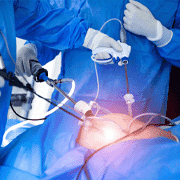A Closer Look at Laparoscopic Surgery
In This Article
A Closer Look at Laparoscopic Surgery
Sreemoyee
Updated on December 11, 2023
Medically verified by Dr. Arya
Fact checked by Dr. Pournami

Laparoscopic
5 min read
What is Laparoscopic Surgery?
Laparoscopic surgery, also known as keyhole surgery, is a modern medical breakthrough. Instead of big incisions, it uses small ones. Think of it as the smartphone of surgery—it's sleek, efficient, and way less bulky.
Why is it Performed?
So, why do we choose laparoscopic surgery? It's versatile. We can use it to diagnose stuff or treat issues in your gut, pelvis, and more.
Here are some common reasons why laparoscopy surgery is performed -
Diagnosis: Doctors use it to see inside the abdomen and diagnose conditions like tumours, cysts, or endometriosis.
Treatment: It's used for various surgeries like gallbladder removal, appendix removal, and hernia repair.
Less Invasive: Laparoscopy is preferred as it involves smaller incisions, leading to quicker recovery and less pain.
Obesity Surgery: Some weight loss surgeries like gastric bypass are done laparoscopically.
Gynaecological Procedures: Women may have laparoscopy for issues like tubal ligation, hysterectomy, or to treat infertility.
Biopsy: Doctors can take tissue samples for examination during laparoscopy.
Pain Investigation: To find the source of unexplained abdominal pain.
Reproductive Health: Used to treat ectopic pregnancies or perform sterilisation.
Exploration: Surgeons can explore and evaluate the abdominal organs for various reasons.
Minimises Scarring: Smaller scars are a cosmetic advantage.
Risks and Benefits of Laparoscopic Surgery
Let's break it down with a table.
| Risks | Benefits |
|---|---|
| Infections at incision sites | Smaller scars |
| Bleeding | Less post-op pain |
| Organ injuries | Quicker recovery |
| Anaesthesia complications | Shorter hospital stay |
| Blood clots | Minimal scars |
How is Laparoscopic Surgery Performed?
We keep it simple.
- You get anaesthesia.
- We make small incisions.
- We slide in a laparoscope with a tiny camera.
- Special instruments go in through other small openings.
- We do the surgery while watching a big screen.
- Finally, we stitch you up or use surgical tape.
How Do You Prepare for Laparoscopic Surgery?
It's like packing for a trip. Here's a handy table.
| Before Surgery | During Surgery | After Surgery/Recovery |
|---|---|---|
| Follow fasting orders | Chill out and cooperate | Rest and let your body heal |
| Review your meds with the doc | Stay in touch with the surgical team | Manage pain as prescribed |
| Arrange your ride home | Let us monitor you closely | Ease back into your routine |
Purpose of Laparoscopic Surgery
Now, let's dive into why we use it for specific treatments:
Pregnancy
How is Laparoscopic Surgery Done?
We use it during pregnancy for things like ectopic pregnancies or ovarian cysts.
Benefits of Laparoscopic Surgery
- Keeps risks low for the baby.
- Less post-surgery discomfort.
 9 min read
9 min readTop 9 Things To Know About Laparoscopic Treatment for Pregnancy
 9 min read
9 min readHow Much Does Laparoscopy Treatment Cost? Here's The Truth
 8 min read
8 min readTreatment After Laparoscopy for Pregnancy - What You Need to Know
Get a Callback Now
UI (Urinary Incontinence)
How is laparoscopic surgery done?
For UI, laparoscopy involves placing a small mesh sling to support the bladder neck. It's like adding some extra backup to your plumbing, but without major surgery.
Benefits of laparoscopic surgery
- Quick recovery, less discomfort.
- You'll be dry and confident again.
Infertility
How is laparoscopic surgery done?
We fix issues like blocked tubes or endometriosis. Tiny incisions, big results.
Benefits of laparoscopic surgery
- You could soon be on your way to parenthood.
- Faster return to daily life.
Fibroid
How is laparoscopic surgery done?
We remove fibroids without major abdominal cuts. Precision at its best.
Benefits of laparoscopic surgery
- Smaller incisions, less scarring.
- Back to your fibroid-free self sooner.
Gallbladder
How is laparoscopic surgery done?
The gallbladder is out without a major tummy overhaul. Minimally invasive all the way.
Benefits of laparoscopic surgery
- Say goodbye to gallstone pain.
- Return to your favourite foods sooner.
Endometriosis
How is laparoscopic surgery done?
Precise removal of endometrial tissue. Smaller incisions, major relief.
Benefits of laparoscopic surgery
- Reduced pain and improved fertility.
- You'll get back to your life, pain-free.
IVF (In Vitro Fertilisation)
How is laparoscopic surgery done?
We prepare the ovaries for IVF with minor adjustments.
Benefits of laparoscopic surgery
- Enhanced IVF success rates.
- Smoother IVF journey.
Infection
How is laparoscopic surgery done?
We drain infected areas, removing the source.
Benefits of laparoscopic surgery
- Faster recovery, minimal scarring.
- Infection-free life ahead.
Kidney Stones
How is laparoscopic surgery done?
We break down or remove stones with precision.
Benefits of laparoscopic surgery
- Say goodbye to excruciating stone pain.
- Get back to your active life.
Cost of Laparoscopy Surgery
Here's the cost range for laparoscopy surgery in India.
-
Basic Procedures: Can start at around ₹25,000 to ₹50,000 (Indian Rupees).
-
Complex Surgeries: More complex procedures can go up to ₹1,00,000 or more.
-
Location Matters: Costs vary based on the city and hospital. Metro cities tend to be pricier.
-
Insurance: Some health insurance plans may cover part of the cost.
-
Additional Expenses: Remember to factor in pre-op and post-op expenses like consultations, medicines, and follow-up visits.
-
Negotiation: You can sometimes negotiate the cost with the hospital.
-
Package Deals: Some hospitals offer package deals which include all costs.
-
Surgeon's Fee: Surgeon fees can also vary, depending on their experience.
Mykare Health’s specially designed features help you get your surgery done with minimal out-of-pocket expense. We offer low cost EMI options. And tackle the entire insurance procedure to make it favourable for you.
Laparoscopy is like modern medicine's secret weapon. From UI to kidney stones, it offers precision, minimal invasion, and quicker recoveries. It's a small change for a big difference in your health and quality of life.



